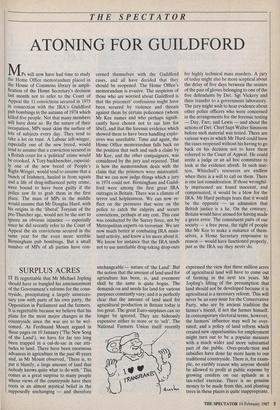SURPLUS ACRES
IT IS regrettable that Mr Michael Jopling should have so bungled his announcement of the Government's reforms for the coun- tryside, precipitating a largely unnecces- sary row with parts of his own party, the Opposition in Parliament and the farmers. It is regrettable because we believe that his plans for the most major changes in the countryside since the war are to be wel- comed. As Ferdinand Mount argued in these pages on 10 January (The New Song of the Land'), we have for far too long been trapped in a cul-de-sac in our atti- tudes to land. There have been enormous advances in agriculture in the past 40 years and, as Mr Mount observed, 'There is, to put it bluntly, a large amount of land that nobody knows quite what to do with.' This comes as a great surprise to many people whose views of the countryside have their roots in an almost mystical belief in the supposedly unchanging — and therefore unchangeable -- nature of 'the Land'. But the notion that the amount of land used for agriculture has been, is, and evermore shall be the same is quite bogus. The demands on and needs for land for various purposes constantly vary; and it is perfectly clear that the amount of land used for agricultural production in Britain today is too great. The great Euro-surpluses can no longer be ignored. They are hideously expensive either to store or to 'sell'. The National Farmers Union itself recently expressed the view that three million acres of agricultural land will have to come out of farming in the next ten years. Mr Jopling's lifting of the presumption that land should not be developed because it is agricultural is a necessary reform. This will never be an easy issue for the Conservative Party, who are by ancient tradition the farmer's friend, if not the farmer himself. In contemporary electoral terms, however, the farmers' influence may well be over- rated; and a policy of land reform which created new opportunities for employment might turn out to be a popular measure with a much wider and more substantial part of the public. Over-production and subsidies have done far more harm to our traditional countryside. There is, for exam- ple, no earthly reason why anyone should be allowed to profit at public expense by growing conifers on our uplands as a tax-relief exercise. There is no genuine money to be made from this, and planting trees in these places is quite inappropriate.


























































 Previous page
Previous page